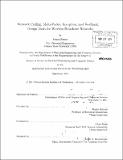Network coding, multi-packet reception, and feedback : design tools for wireless broadcast networks
Author(s)
Rezaee, Arman
DownloadFull printable version (6.906Mb)
Alternative title
Design tools for wireless broadcast networks
Other Contributors
Massachusetts Institute of Technology. Dept. of Electrical Engineering and Computer Science.
Advisor
Muriel Médard and Linda Zeger.
Terms of use
Metadata
Show full item recordAbstract
In this thesis, we address the combination of three technologies in wireless broadcast networks: network coding, multi-packet reception (MPR) and feedback. We will primarily discuss the performance of a single-hop network, both with and without these technologies. A single-hop network can be used as a building block for larger and more topologically diverse networks and provides a basis for analyzing the interaction of these mechanisms. Because many applications are interested in speedy transmission of data, we have focused our attention on answering the question of how to optimally use these technologies in order to reduce the overall transmission time. Initially, we consider a fully connected network and show that MPR capability of m can reduce the total time for a file transfer by as much as a factor of m/2 without network coding. We emphasize that a two-fold MPR capability will not reduce the total dissemination time without network coding and is thus ineffective. We also show that no gain can be obtained, if network coding is used without MPR. However the combination of network coding and MPR can reduce the total transfer time by as much as a factor of m. We then consider transmission of a file over a broadcast erasure channel with a potentially large number of receivers. Noting that traditional reliable multicast protocols suffer from the inevitable feedback implosion associated with servicing a large number of receivers, we present a novel feedback protocol dubbed SMART, Speeding Multicast by Acknowledgment Reduction Technique. The protocol involves an asymptotically optimal predictive model which determines a suitable feedback time that assures most receivers have completed the download. We also introduce a new single slot feedback mechanism, which enables any number of receivers to give their feedback simultaneously. We show that scheduling the feedback according to this predictive model and enhancing the protocol by the single slot mechanism reduces the feedback traffic as well as transmission of extraneous coded packets, and will provide a good completion time characteristic for all users. We show that counter to conventional wisdom, Quality of Experience (QoE) of multicast sessions is not sensitive to the number of users, however it is very sensitive to imbalanced effective rate and heterogeneity among users. Furthermore, we show that SMART performs nearly as well as an omniscient transmitter that requires no feedback.
Description
Thesis (S.M.)--Massachusetts Institute of Technology, Dept. of Electrical Engineering and Computer Science, 2011. Cataloged from PDF version of thesis. Includes bibliographical references (p. 89-92).
Date issued
2011Department
Massachusetts Institute of Technology. Department of Electrical Engineering and Computer SciencePublisher
Massachusetts Institute of Technology
Keywords
Electrical Engineering and Computer Science.